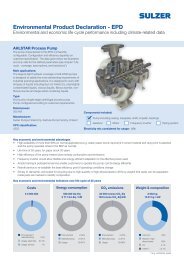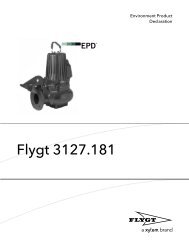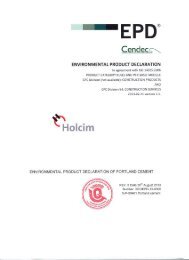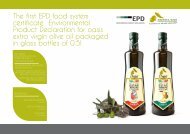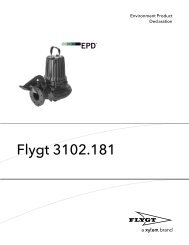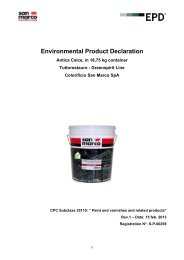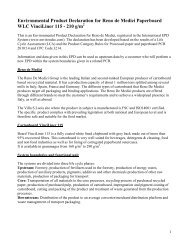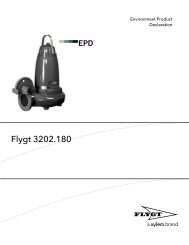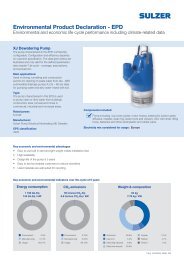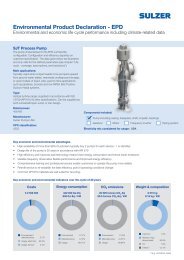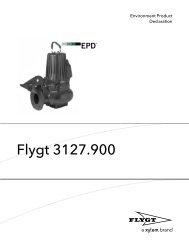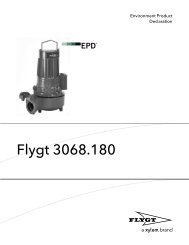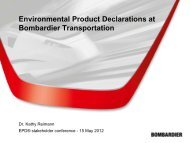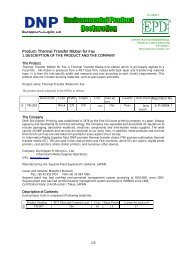Luca Ruini, Barilla - The International EPD® System
Luca Ruini, Barilla - The International EPD® System
Luca Ruini, Barilla - The International EPD® System
You also want an ePaper? Increase the reach of your titles
YUMPU automatically turns print PDFs into web optimized ePapers that Google loves.
Stakeholder conference<br />
Bologna 2013/06/04<br />
<strong>Barilla</strong> Experience<br />
<strong>Luca</strong> F. <strong>Ruini</strong><br />
Global HSE & E Director & BCFN Expert
EPD, Sustainability<br />
& Competitiveness<br />
1. Why <strong>Barilla</strong> decided move to EPD Process?<br />
2. Is it an useful tool to develop projects?<br />
3. What is changing around this topics?
LCA during 2004-2008<br />
4<br />
spaghetti n°5 and<br />
Campagnole LCA<br />
Logistic activities<br />
LCA<br />
Parma plant<br />
First pilot LCA<br />
done during 2000<br />
Foggia and Melfi<br />
plant<br />
Packaging LCA<br />
Carbon management<br />
All plants<br />
Carbon management<br />
Parma and<br />
Castiglione<br />
plants<br />
Waste management<br />
2004 2005 2006 2007<br />
2008
LCA, EPD & EPD <strong>System</strong> up to now<br />
5<br />
Closed projects<br />
Running projects<br />
Packaging LCA<br />
Durum wheat pasta LCA &<br />
EPD (Italy)<br />
WASA products LCA<br />
Durum wheat pasta EPD<br />
update (worldwide)<br />
WASA products EPD<br />
3 EPDs published<br />
Bakery LCA<br />
Sauces LCA<br />
5 EPDs published<br />
6 EPDs published<br />
32 EPDs published<br />
<strong>Barilla</strong> EPD Process <strong>System</strong><br />
Development and update<br />
EPD realization following the EPD system<br />
EPDs realization following<br />
the EPD <strong>System</strong><br />
Cropping system project: phase 1<br />
LCA on primary transport<br />
Cropping system project:<br />
phase 2<br />
LCA on primary and<br />
secondary transport (update)<br />
2009 2010<br />
2011<br />
2012<br />
2013
Life Cycle Assessment<br />
Footprints<br />
Carbon Footprint<br />
gCO2-eq per kg or Litre of food<br />
Water Footprint<br />
Litre per kg or Litre of food<br />
Ecological Footprint<br />
Global m 2 per kg or Litre of food
From EPD to <strong>Barilla</strong> EPD Process (<strong>System</strong>)<br />
7<br />
‣ PCR reliability assured by an open consultation<br />
‣ Comparability among the same product group<br />
‣ Possibility to develop an EPD Process system<br />
<strong>Barilla</strong> is the<br />
First Food<br />
Company
<strong>Barilla</strong> EPD Process (<strong>System</strong>)<br />
EPD Certified & Published at April 2013 33<br />
8<br />
EPD <strong>Barilla</strong> Certified & Published up to January 2013
<strong>Barilla</strong> EPD Process <strong>System</strong><br />
9<br />
A “FUNNEL” PROCESS<br />
<strong>The</strong> system works as a<br />
“funnel process”: data<br />
from the database and<br />
from product specific<br />
information are<br />
processed by the<br />
product system tool in<br />
order to have the<br />
specific LCA data<br />
sheet.<br />
This document is then<br />
used for the preparation<br />
of the EPD.<br />
DATA COLLECTION<br />
AND MANAGEMENT<br />
DATA PROCESSING<br />
RESULTS MANAGEMENT<br />
(Internal documentation production)<br />
PUBLICATION<br />
(Public documents in output)<br />
LCA<br />
DATABASE<br />
LCA<br />
data<br />
sheet<br />
EPD<br />
PRODUCT<br />
SPECIFIC<br />
DATA
<strong>Barilla</strong> EPD Process <strong>System</strong><br />
10<br />
THE LCA EVALUATES A COMPLEX MODEL<br />
DURUM<br />
WHEAT<br />
CULTIVATION<br />
MILL<br />
PROCESS<br />
PACKAGING<br />
MATERIALS<br />
PASTA<br />
PLANTS<br />
PRODUCT TRANSPORT<br />
Durum wheat<br />
crop<br />
DURUM<br />
WHEAT SOIL<br />
MANAGEMEN<br />
T<br />
FERTILIZER<br />
PRODUCTIO<br />
N<br />
NATURAL GAS<br />
EXTRACTION<br />
LCA model of the pasta production and contribution to CO 2 emissions
<strong>Barilla</strong> EPD Process <strong>System</strong><br />
11<br />
HOW DOES THE SYSTEM WORK?<br />
EPD management activity<br />
EPD project<br />
plan<br />
Documentation<br />
Competences<br />
evaluation<br />
Process<br />
assessment<br />
planning<br />
Non conformity<br />
management<br />
Management<br />
review<br />
Process<br />
indicators<br />
EPD<br />
project<br />
Start up<br />
Product<br />
data<br />
collection<br />
Data<br />
check<br />
Data<br />
elaboration<br />
EPD<br />
preparation<br />
EPD<br />
verification<br />
EPD<br />
publication<br />
Database<br />
update<br />
Start up<br />
Data<br />
collection<br />
Database<br />
calculation<br />
Data<br />
validation<br />
Product<br />
system<br />
update<br />
Start up<br />
Data<br />
collection<br />
Product<br />
system<br />
update<br />
Product<br />
system<br />
validation
<strong>Barilla</strong> EPD Process <strong>System</strong><br />
12<br />
PROCESS INDICATORS<br />
<strong>The</strong> EPD process performances are evaluated by mean of specific indicators<br />
that are recorded in the EPD process register.<br />
INDICATORS<br />
Situation at<br />
30/04/2012<br />
DESCRIPTION<br />
PUBLISHED EPD<br />
33<br />
Number of published EPDs available<br />
EPD IN PROCESS<br />
16<br />
TOTAL MODULE<br />
about 1000<br />
AVAILABLE DATA<br />
90%<br />
VALIDATED DATA<br />
83%<br />
Number of the product that will be covered by an available EPD when<br />
the running project will be completed<br />
Total amount of the data modules that are needed for completing the<br />
EPD activities included in the running project.<br />
Percentage of the total data module available for EPD realization. It<br />
represents how much the data collection performance is completed.<br />
Percentage of the total data module that are validated and ready for<br />
the EPD calculation. In represents the measure on how much the<br />
database is completed with validated information.
How can you manage?<br />
<strong>Barilla</strong> EPD Process <strong>System</strong><br />
13<br />
DATAMODULE REALIZED<br />
Part of the<br />
Product<br />
<strong>System</strong><br />
LCA Database<br />
Product<br />
Specific Data<br />
LCA stages<br />
Datamodule<br />
(number)<br />
Product raw material 296<br />
Plant 77<br />
Mill 28<br />
Packaging raw Material 60<br />
Energy mix 160<br />
Product recipe 159<br />
Packaging list of bill 94<br />
Specific consumption 126<br />
Transport 114<br />
TOTAL DATAMODULE 1114
Climate Change (extreme events) & GHG<br />
14<br />
Note: recorded anomalies in average temperature10<br />
from the period 1901-2000
<strong>Barilla</strong> Enviromental Product Declaration (EPD)
How to use it?<br />
17
Why so many EPD?<br />
18<br />
From LCA to Environmental Actions
Plant … Energy, C02eq & Water reduction<br />
Carbon Footprint<br />
adopted as an<br />
<strong>Barilla</strong> Company<br />
official KPI<br />
Pack recyclability
Why so many EPD?<br />
20<br />
HANDBOOK FOR SUSTAINABLE CULTIVATION OF QUALITY DURUM<br />
WHEAT<br />
<strong>The</strong> Handbook for durum wheat<br />
cultivation comes from the results<br />
of the pasta EPD study. <strong>The</strong><br />
handbook is a list of guiding<br />
principles for farmers choices, into<br />
the complex challenge of modern<br />
agriculture.<br />
DON reduction<br />
(Food Safety)<br />
Yield increase<br />
and quality<br />
improvement<br />
Environmental<br />
impact<br />
reduction
<strong>Barilla</strong> Sustainable Grains Project<br />
Parma<br />
Durum Wheat in Italy<br />
Parma<br />
Siena<br />
2011 2012 2013 2014<br />
Farmers test 15 100 500<br />
Durum 10kt 50kt<br />
Ferrara<br />
Ancona<br />
Macerata<br />
Foggia<br />
Study results<br />
confirmed<br />
-36% Co2eq<br />
- 100 €/ha<br />
2012 www projects<br />
Country Cereal Technical Partner<br />
Italy Durum wheat Horta<br />
Germany Soft wheat LFL - Bavarian State Research Center for Agriculture<br />
Greece Durum wheat University of <strong>The</strong>ssaly<br />
France Soft wheat, durum wheat Axereal<br />
Turkey Durum wheat University of Sanliurfa<br />
Sweden Rye Lantmannen<br />
Canada Durum wheat CWB<br />
USA Durum wheat<br />
Sustainability Consortium (tbc)
EU CSR Award 2013<br />
22<br />
<strong>The</strong> Award for Corporate Sustainability organized by Sodalitas Foundation, which enhances the commitment of companies in<br />
sustainability, saw the participation of 244 companies and 192 projects submitted candidates. But only 11 winners were awarded<br />
with recognition of the scope, during the event "Young people and work: priorities for the country," in which it was dealt with the issue<br />
of youth employment as a priority to overcome the crisis.<br />
Large companies category winner<br />
Winner: <strong>Barilla</strong> - Sustainable Agriculture: a multidisciplinary study<br />
EU CSR Sodalitas Social Award 2013<br />
In 2009 <strong>Barilla</strong> - in collaboration with HORTA from Catholic University of Piacenza and the contribution of Life Cycle Engineering in<br />
Turin - has launched a study to assess the possibility of increasing the efficiency of farming systems and the quality of the product, in<br />
order to provide to the operating world the tools to improve the overall profitability of farms and the environmental impact of the field<br />
production. In this project, the producers of durum wheat have been able to achieve - through the use of the “handbook of cultivation"<br />
developed by the company - significant results in terms of reducing the cost of cultivation (10%), reduction of nitrogen inputs (-17%)<br />
and reduction of CO 2 emissions (-14%).
THE BCFN FLAGSHIP CONCEPT:<br />
WHAT IS GOOD FOR YOU IS GOOD FOR THE PLANET
Water Footprint
Carbon Footprint
THE BCFN FLAGSHIP CONCEPT:<br />
WHAT IS GOOD FOR YOU IS GOOD FOR THE PLANET
Environmental impact of different dietary habit<br />
- 1/3
Sustainability & Business<br />
In <strong>Barilla</strong> 2013 is the year of the<br />
1. Brand CSR Strategy definition<br />
MKTG has been searching their<br />
2. CSR Retailer collaboration<br />
3. Sustainable Durum Wheat<br />
& GSC CSR project
Cage free hens<br />
2011<br />
2012<br />
First Mulino Bianco<br />
Sustainability ADV Pills<br />
Biscuits<br />
Recyclable Pack<br />
New Pack <strong>System</strong><br />
Renewable Energy
Supply Chain CSR Project are<br />
becoming more & more<br />
important …<br />
…MKTG have been using them
Plant … Energy, C02eq & Water reduction<br />
Carbon Footprint<br />
adopted as an<br />
<strong>Barilla</strong> Company<br />
official KPI<br />
Pack recyclability<br />
<strong>Barilla</strong> EPD Environmental Product Declaration<br />
30<br />
EPD<br />
2012<br />
on website
… CSR Project are becoming more<br />
important … also for Retailers<br />
Retailer Collaboration
Carbon Label French Project<br />
34<br />
Environmental information example<br />
adopted in French labelling<br />
1 - Physical value<br />
2 – Relative scale without physical value<br />
3 - Single vote in numbers aggregating<br />
different impacts (or percentage)<br />
4 - Single vote in letters aggregating<br />
different impacts<br />
5 - Relative scale and physical value<br />
6 - Vote for each criterion and global vote
Retailers Collaboration in France<br />
PARCE QU’ON EST TROP SOUVENT PERDU<br />
PARMI LES OFFRES DE PRODUITS DIT<br />
«RESPONSABLES»<br />
E.LECLERC INNOVE ET CRÉE LA DÉMARCHE<br />
CONSO RESPONSABLE<br />
http://www.conso-responsable.fr/<br />
Harry’s & <strong>Barilla</strong> have<br />
been working in order<br />
to take part of the<br />
Conso E.Leclerc<br />
Responsible Project &<br />
be more visible on the<br />
shelf
Retailers Collaboration
Retailers Collaboration<br />
© 2013 CARBON DISCLOSURE PROJECT<br />
EU RECs Wasa Project<br />
is elected by the biggest<br />
US retailers WallMart<br />
In order to reduce<br />
Its footprint: a German<br />
Green project used in US !!!
Retailers Collaboration
CGF& Sustainability Consortium partnership<br />
39
CGF& Sustainability Consortium partnership<br />
42
<strong>The</strong> Consumer Goods Forum<br />
43
Why so many EPD?<br />
44<br />
Walmart Sustainability
<strong>Luca</strong>’s final remarks<br />
1. <strong>The</strong> transition to CO2 Climate Smart Economy is a<br />
decision taken after Copenhagen (even if is a piece of full<br />
CSR picture)<br />
2. CSR is starting to be not only a issue of 15% people<br />
3. More innovation is starting to be environmental driven<br />
4. Company are developing CSR Brand strategy<br />
5. Measure is a conventional even if scientific base exercise<br />
6. EPD is a tool to measure (full ISO compliance) PCR<br />
centered<br />
7. But other experience (Granelle Law in FR, EU Commission<br />
& Sustainable Consortium) are moving fast<br />
8. Harmonization, mutual recognition of different systems,<br />
PCR & dBase…. the real challenge is which kind of<br />
Governance we hope?
Thank you<br />
luca.ruini@barilla.com
<strong>Barilla</strong> EPD Process <strong>System</strong><br />
47<br />
PROCESS OPERATIONS: THE PILLAR ELEMENTS<br />
<strong>The</strong> system framework is organized among the following main elements:<br />
• <strong>The</strong> LCA databases, in which all the most important raw materials, production<br />
plants, packaging materials and other useful information are studied. <strong>The</strong><br />
database consists of a set of Data modules containing all the information that<br />
are internally verified. <strong>The</strong> available information is ready to be used for the EPD<br />
purposes;<br />
• <strong>The</strong> Product system, that represents the product group model calculation<br />
tool. <strong>The</strong> system includes few product systems based on the specific PCR<br />
(such as pasta, bakery, sauces). <strong>The</strong> product systems are internally verified and<br />
they are ready to be used for the EPD purposes;<br />
• <strong>The</strong> Product specific data, related to the production of a particular product.<br />
<strong>The</strong>y have to be collected for each EPD and include product recipe, involved<br />
production plants, packaging list of bill, transport information.
LCA database<br />
48<br />
LCA DATABASE FRAMEWORK<br />
<strong>The</strong> database is organized among different data module groups.<br />
Raw<br />
materials<br />
information about the cultivation and the processes operation of the main raw<br />
materials used for the <strong>Barilla</strong>’s product preparation. Example of these are<br />
durum and soft wheat, tomatoes, rye, sugar, palm oil, eggs, etc. <strong>The</strong>se data<br />
are updated as soon as new information is available<br />
Plants<br />
information about the processes that take place in the <strong>Barilla</strong>’s plant. <strong>The</strong>se<br />
data are based on the data collection and they are updated every year.<br />
Electricity<br />
Packaging<br />
Transports<br />
Other<br />
data about the energy mixes used in the countries in which the <strong>Barilla</strong>’s plants<br />
are located. This database, that is updated every time new information is<br />
available, contains also data about the RECS certified energy<br />
data about materials used for the primary and secondary packaging used for<br />
the <strong>Barilla</strong>’s products<br />
data about the main way of transports used for the <strong>Barilla</strong> purposes<br />
data about other environmental aspects that are analyzed by mean of<br />
secondary data.
Product Specific data<br />
PRODUCT SPECIFIC DATA<br />
49<br />
Product recipe<br />
Packaging list of bill<br />
Product specific data<br />
Production plants: name and<br />
quantities<br />
Distribution of finished product<br />
(km and transport type)<br />
Other specific environmental<br />
aspects (specified in the data<br />
collection procedure)
Product <strong>System</strong><br />
AN EXAMPLE OF PRODUCT SYSTEM<br />
50<br />
Product specific data LCA database Total<br />
Recipe<br />
Grams of ingredients per kg<br />
of product<br />
X<br />
Impacts per kg of<br />
ingredients<br />
=<br />
Impacts per kg of products<br />
due to the ingredients<br />
+<br />
Plants<br />
Plants in which the product is<br />
made and quantities<br />
X<br />
Impacts per kg of products<br />
made by the specific plants<br />
=<br />
Impacts per kg of products<br />
due to the production<br />
+<br />
Specific<br />
environmental<br />
aspects<br />
Natural gas for bakery<br />
X<br />
Impacts per Nm 3 of burned<br />
NG<br />
=<br />
Impacts per kg of products<br />
due to the bakery<br />
+<br />
Packaging list<br />
of bill<br />
Grams of materials per kg of<br />
product<br />
X<br />
Impacts per kg of<br />
packaging materials<br />
=<br />
Impacts per kg of products<br />
due to the packaging<br />
+<br />
Transportation<br />
Km covered by train, truck<br />
and ship<br />
X<br />
Impacts per km by train,<br />
truck and ship<br />
=<br />
Impacts per kg of products<br />
due to the transportation<br />
=<br />
LCA results<br />
Impacts per kg of<br />
product
EPD Process Activities<br />
51<br />
EPD PROJECT<br />
EPD management activity<br />
EPD project<br />
plan<br />
Documentation<br />
Competences<br />
evaluation<br />
Process<br />
assessment<br />
planning<br />
Non conformity<br />
management<br />
Management<br />
review<br />
Process<br />
indicators<br />
EPD<br />
project<br />
Start up<br />
Product<br />
data<br />
collection<br />
Data<br />
check<br />
Data<br />
elaboration<br />
EPD<br />
preparation<br />
EPD<br />
verification<br />
EPD<br />
publication<br />
Database<br />
update<br />
Start up<br />
Data<br />
collection<br />
Database<br />
calculation<br />
Data<br />
validation<br />
Product<br />
system<br />
update<br />
Start up<br />
Data<br />
collection<br />
Product<br />
system<br />
update<br />
Product<br />
system<br />
validation<br />
EPD project process aims at preparing the EPD document, ready for the<br />
publication
EPD Process Activities<br />
52<br />
DATABASE UPDATE<br />
EPD management activity<br />
EPD project<br />
plan<br />
Documentation<br />
Competences<br />
evaluation<br />
Process<br />
assessment<br />
planning<br />
Non conformity<br />
management<br />
Management<br />
review<br />
Process<br />
indicators<br />
EPD<br />
project<br />
Start up<br />
Product<br />
data<br />
collection<br />
Data<br />
check<br />
Data<br />
elaboration<br />
EPD<br />
preparation<br />
EPD<br />
verification<br />
EPD<br />
publication<br />
Database<br />
update<br />
Start up<br />
Data<br />
collection<br />
Database<br />
calculation<br />
Data<br />
validation<br />
Product<br />
system<br />
update<br />
Start up<br />
Data<br />
collection<br />
Product<br />
system<br />
update<br />
Product<br />
system<br />
validation<br />
Database update process aims at keeping updated the <strong>Barilla</strong>’s database.<br />
It is performed each time the database need to be updated.
EPD Process Activities<br />
53<br />
PRODUCT SYSTEM UPDATE<br />
EPD management activity<br />
EPD project<br />
plan<br />
Documentation<br />
Competences<br />
evaluation<br />
Process<br />
assessment<br />
planning<br />
Non conformity<br />
management<br />
Management<br />
review<br />
Process<br />
indicators<br />
EPD<br />
project<br />
Start up<br />
Product<br />
data<br />
collection<br />
Data<br />
check<br />
Data<br />
elaboration<br />
EPD<br />
preparation<br />
EPD<br />
verification<br />
EPD<br />
publication<br />
Database<br />
update<br />
Start up<br />
Data<br />
collection<br />
Database<br />
calculation<br />
Data<br />
validation<br />
Product<br />
system<br />
update<br />
Start up<br />
Data<br />
collection<br />
Product<br />
system<br />
update<br />
Product<br />
system<br />
validation<br />
Product system update process aims at:<br />
- Updating the existing product system each time there are significant changes<br />
- Realizing the product system of a new product
<strong>Barilla</strong> EPD Process <strong>System</strong><br />
THE LCA EVALUATES A COMPLEX MODEL<br />
PLANT<br />
SPECIFIC<br />
CONSUMPTION<br />
54<br />
RECIPE<br />
PACKAGING<br />
TRANSPORT<br />
SOFT WHEAT<br />
CULTIVATION<br />
FERTILIZER<br />
PRODUCTION<br />
LCA model of Tarallucci production and contribution to CO 2 emissions
Footprint KPI relevant for the food field<br />
55<br />
Carbon Footprint represents the total amount of<br />
greenhouse gas (GHG) emitted either directly or<br />
indirectly by human activity throughout overall<br />
life-cycle. It is expressed in equivalent tons of<br />
CO 2<br />
PAS 2050:2008<br />
ISO 14064:2006<br />
.<br />
Water Footprint measures water consumption in terms of<br />
Volume employed (evaporated) and/or polluted per unit of time<br />
throughout overall life-cycle.<br />
Ecological Footprint is a measure of the number of land or maritime<br />
(www.waterfootprint.org)<br />
plots necessary to regenerate the resources consumed<br />
and absorb the waste produced by human settle-<br />
ments or a single human activity, employing<br />
measures of dominant resource and technology<br />
management.



